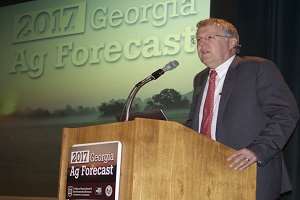By Samuel L. Pardue
It is often said that farmers are faithful, optimistic people. It takes a special kind of person to put a seed in the ground, help birth a calf or watch a chick hatch from an egg – to knowingly start down the path to turn that small beginning into food and fiber for the world.

This week we held our annual Georgia Ag Forecast seminars across the state. This long-running partnership between the University of Georgia College of Agricultural and Environmental Sciences, Georgia Farm Bureau, Farm Credit of Southwest Georgia and Georgia Department of Agriculture, with support from Georgia Agribusiness Council, is part of our commitment to get the best information from the university to farmers, ranchers and green industry producers so they can make the best planning, planting and production decisions.
Farming is always an uncertain enterprise. The year past was and the year ahead will be no different. Even with the best available research in hand for planning, farmers find themselves at the mercy of the weather, the markets and nature. This year alone, our farmers faced low commodity prices, a hurricane and severe drought.
And then there’s the ever-changing policy element to factor in.
In the year ahead, Congress will begin to hammer out a new national farm bill that will guide our agricultural policy for the next five years. It’s a daunting task that involves everything from crop insurance to commodity programs, from rural development to the nation’s nutrition programs.
This year, Georgia is fortunate to have tremendous leaders in Washington in key positions. President Donald Trump named former Georgia Gov. Sonny Perdue as his secretary of agriculture nominee. U.S. Rep. Austin Scott, R-Tifton, is chairman of the House Agriculture Subcommittee on Commodity Exchanges, Energy, and Credit. U.S. Rep. Sanford Bishop, D-Columbus, was named ranking member of the House Appropriations Subcommittee on Agriculture, Rural Development, Food and Drug Administration, and Related Agencies. Former Georgia Farm Bureau President Zippy Duval is now president of the American Farm Bureau Federation.
In addition, U.S. Sen. David Perdue, R-Georgia, serves on the Senate agriculture committee and U.S. Reps. David Scott, D-Smyrna, and Rick Allen, R-Augusta, serve on the House agriculture committee. These appointments prove that Georgia is fertile ground for growing strong national leaders in agriculture.
UGA’s College of Agricultural and Environmental Sciences has worked hand in hand with these leaders for many years to ensure that Georgia agriculture continues to be a major part of the U.S. food system, providing the needed research and education to keep our industry strong and our food supply secure.
While nature and economics will always be fickle, our commitment to Georgia’s faithful farmers remains strong. The forecast is indeed bright.
Source: uga.edu